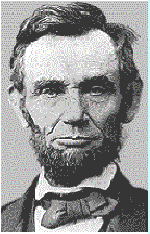Missouri Compromise - 1820
 |
In 1820, the Missouri Compromise took effect,
allowing Missouri to be admitted to the Union as a slave state, but also prohibiting
slavery north of a line 36 degrees, 30 minutes. The compromise in Congress pitted 11
non-slave states against 11 slave states, with agreement coming only when it was
determined that Maine would enter the Union (March 15, 1820) as a non-slave state and
Missouri (August 10, 1821) as a slave state, thus maintaining a like number of non-slave
and slave states. It would be repealed later by the Stephen A. Douglas’
Kansas-Nebraska bill in 1854, which reopened the issue of slavery in the territories, just
prior to the advent of the Civil War. The
bill aroused great resentment in the North. It caused Abraham Lincoln to return to
politics, and, in 1856, the birth of the Republican Party to oppose the extension of
slavery. Lincoln was the party’s most outspoken leader in Illinois. |
'Black History' segment
written in June, 1998 by David Lodge
[ Back to Black History Index ] |

